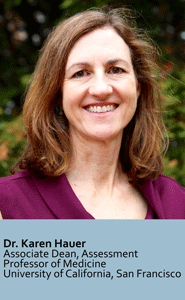Trust as the Basis for Assessment of Clinical Trainees in the Workplace: Optimizing Supervision, Learning and Fairness
Dr. Karen Hauer

Date: Wednesday, February 20, 2019
Time: 12:00pm to 1:30pm (feel free to bring a bagged lunch)
Locations:
- DHCC 2267 (host venue)
- IRC 305
- RJH CA 120
- NHSC 9-374
Remote:
- Additional locations are available. Please email ches.communications@ubc.ca to request an additional site.
Abstract
Trust facilitates trainees’ active roles in the clinical workplace and can serve as the basis for assessment in medical education. This presentation will explore the concept of trust from the supervisor, learner, and program perspectives. Supervisors accept a certain amount of vulnerability in allowing trainees to conduct clinical care with varying degrees of supervision. The factors that inform decisions about trust and the literature supporting their contributions to trust provide guidance in the form of design principles on how to structure learning and assessment to facilitate entrustment decisions. Trust is optimized within the context of longitudinal relationships so that opportunities to earn trust guide learning activities, and the associated assessment activities carry meaning for learners. That is, learners should appreciate the rationale for an assessment, identify connections to their current learning, and see how the results of the assessment will influence their future learning and performance. In addition to a strong theoretical framing, an assessment system based on trust also demands rigorous attention to buy-in and feasibility within an educational program as a whole. Educators and learners within a training program must comprehend and agree that the assessment system measures the construct it is intended to measure. Group decision-making offers the opportunity for programs to shift from judgments of competence that are implicit and default to a more developmental orientation informed by evidence. Trust can enhance the fairness of an assessment system, which entails consideration of the clarity of expectations, learning and feedback opportunities, and equity.
Biography
Dr. Karen Hauer is Associate Dean for Assessment and Professor of Medicine at the University of California, San Francisco (UCSF). She designs and leads the program of assessment in the UCSF School of Medicine Bridges curriculum and directs the School’s medical student coaching program. She is an active researcher in medical education and a research mentor for fellows, residents and students, with a focus on competency-based medical education, learner assessment, coaching and remediation. In 2015, she completed a PhD in Medical Education through a joint program with UCSF and the University of Utrecht in the Netherlands. She is active on leadership committees with the National Board of Medical Examiners and is past president of the Clerkship Directors in Internal Medicine national organization. She earned her undergraduate degree at Stanford University, and then completed medical school, internal medicine residency, and chief residency at UCSF. She is a practicing general internist in primary care. She is married and has 3 children.
Accreditation:
The University of British Columbia Division of Continuing Professional Development (UBC CPD) is fully accredited by the Committee on Accreditation of Continuing Medical Education (CACME) to provide study credits for continuing medical education for physicians. This event is an Accredited Group Learning Activity (Section 1) as defined by the Maintenance of Certification Program of the Royal College of Physicians and Surgeons of Canada, and approved by UBC CPD. You may claim a maximum of 1.5 (x 10 sessions) hours (credits are automatically calculated). This Group Learning program meets the certification criteria of the College of Family Physicians of Canada and has been certified by UBC CPD for up to 1.5 (x 10 sessions) Mainpro+ credits. Each physician should claim only those credits he/she actually spent in the activity.
